Tech
The Galaxy Z Fold 6 is nearly here, but I’ve already found the foldable phone I’ve been waiting for
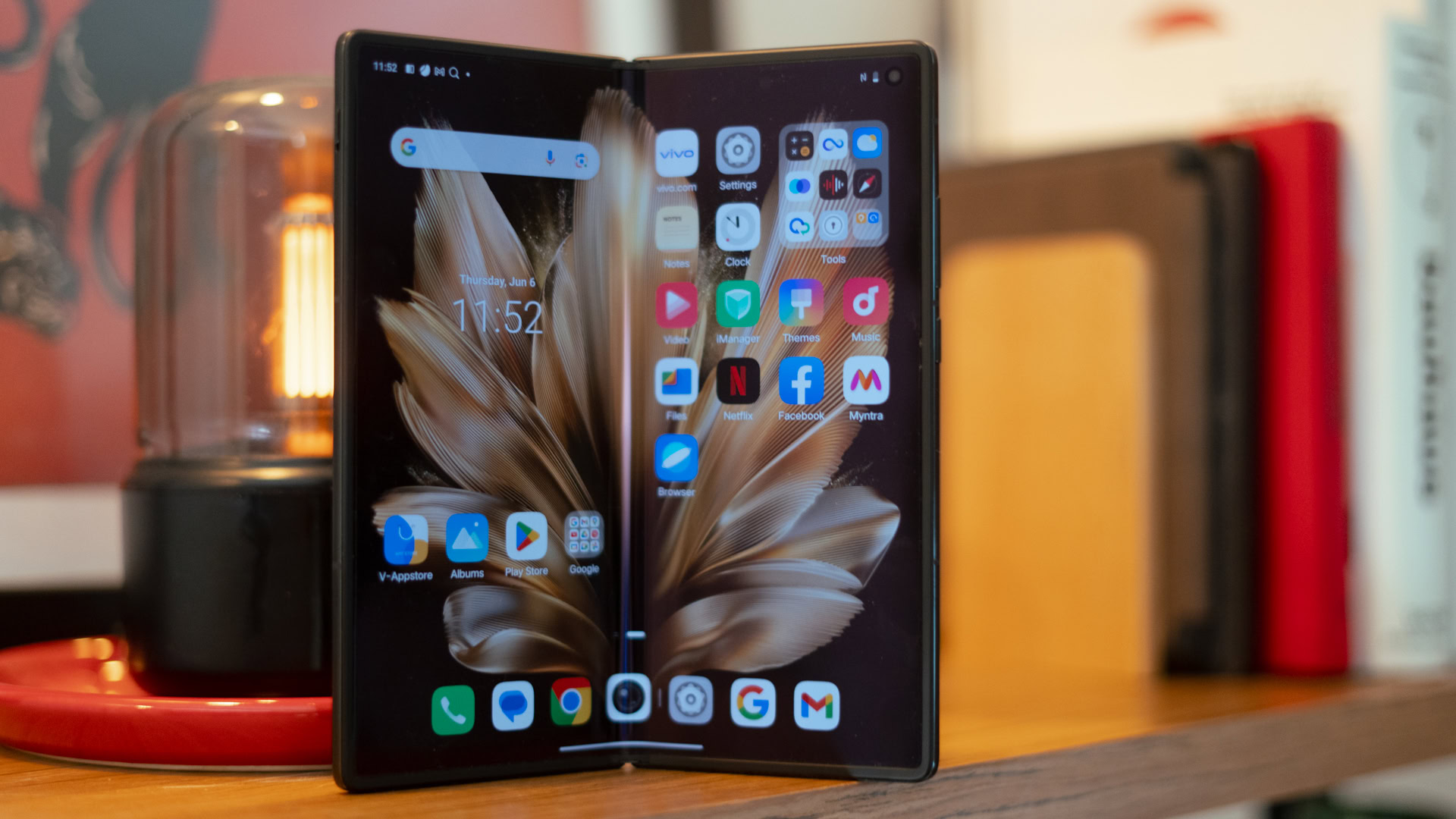
Dhruv Bhutani / Android Authority
Foldable phones are starting to get commonplace, but several factors have kept them from going mainstream. And no, I’m not just talking about their sky-high price points. Whether it’s their relative thickness, battery life, or camera quality, foldable phones have often been a compromised experience compared to their mainstream counterparts. As much as I love my OnePlus Open, it’s designed for a specific, productivity-minded audience. However, if foldables are to be the future of smartphones, they need to deliver on all fronts. And so far, almost no foldable has delivered on that.
This is where the vivo X Fold 3 Pro comes in. While it doesn’t stray from the norm in terms of price, it might just be the first foldable smartphone to offer a truly no-compromises experience. Its claim to fame lies in several world-first features that, at least on paper, don’t just bring feature and experience parity with conventional flagships but exceed them in meaningful ways.
After using the X Fold 3 Pro for the past few weeks, I’m convinced that vivo has crafted the first foldable that is good enough to take on any premium smartphone — and not just on the merits of its larger screen estate. But more than that, it sets the bar incredibly high for Samsung’s Galaxy Z Fold 6 to match.
Slim without compromises
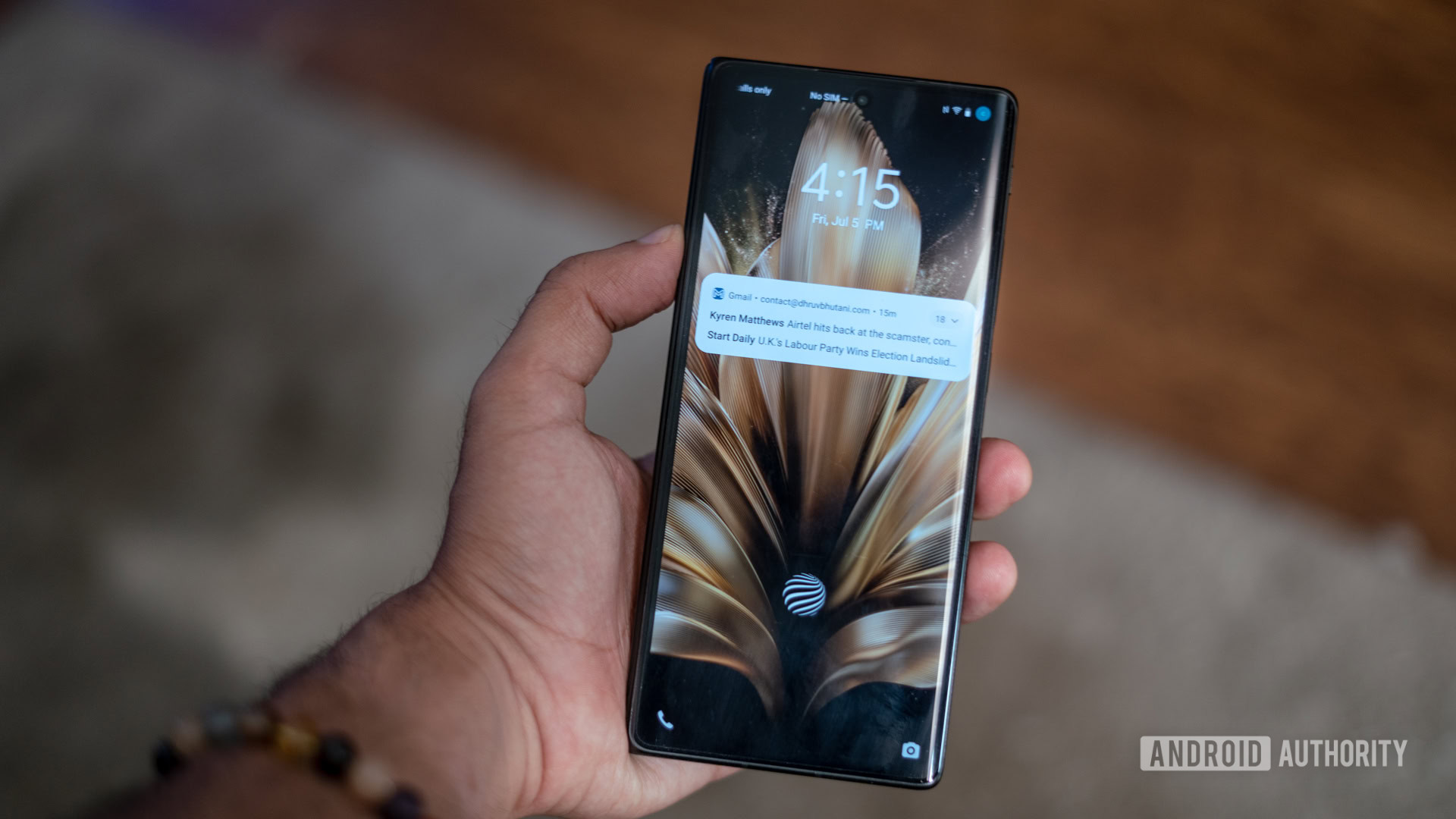
Dhruv Bhutani / Android Authority
Foldable phones have intrigued me since the first Samsung Galaxy Z Fold launched in 2019. However, Samsung’s tall and thin front display has always been too narrow for comfortable everyday use, and if rumors are to be believed, the latest iteration won’t make many changes on that front. Last year’s OnePlus Open changed the game with a wider 6.31-inch front display, finally getting me to commit to the form factor.
The vivo X Fold 3 Pro takes it a step further. Its 6.51-inch screen with a 21:9 aspect ratio, similar to conventional smartphones, offers just the right amount of extra room to type long messages or emails comfortably. This subtle change also creates a more usable front display with room for an extra row of icons or a bigger camera viewfinder. Personally, I still prefer the slightly wider stance of the OnePlus Open, but it’s really down to individual preference, and both phones are significantly better than what Samsung offers.
The larger front panel also translates to a larger inner display. The 8.03-inch screen is noticeably bigger than what Samsung and OnePlus offer. Enhanced productivity is a big selling point for foldables; a larger display certainly plays into that narrative. However, size isn’t everything.
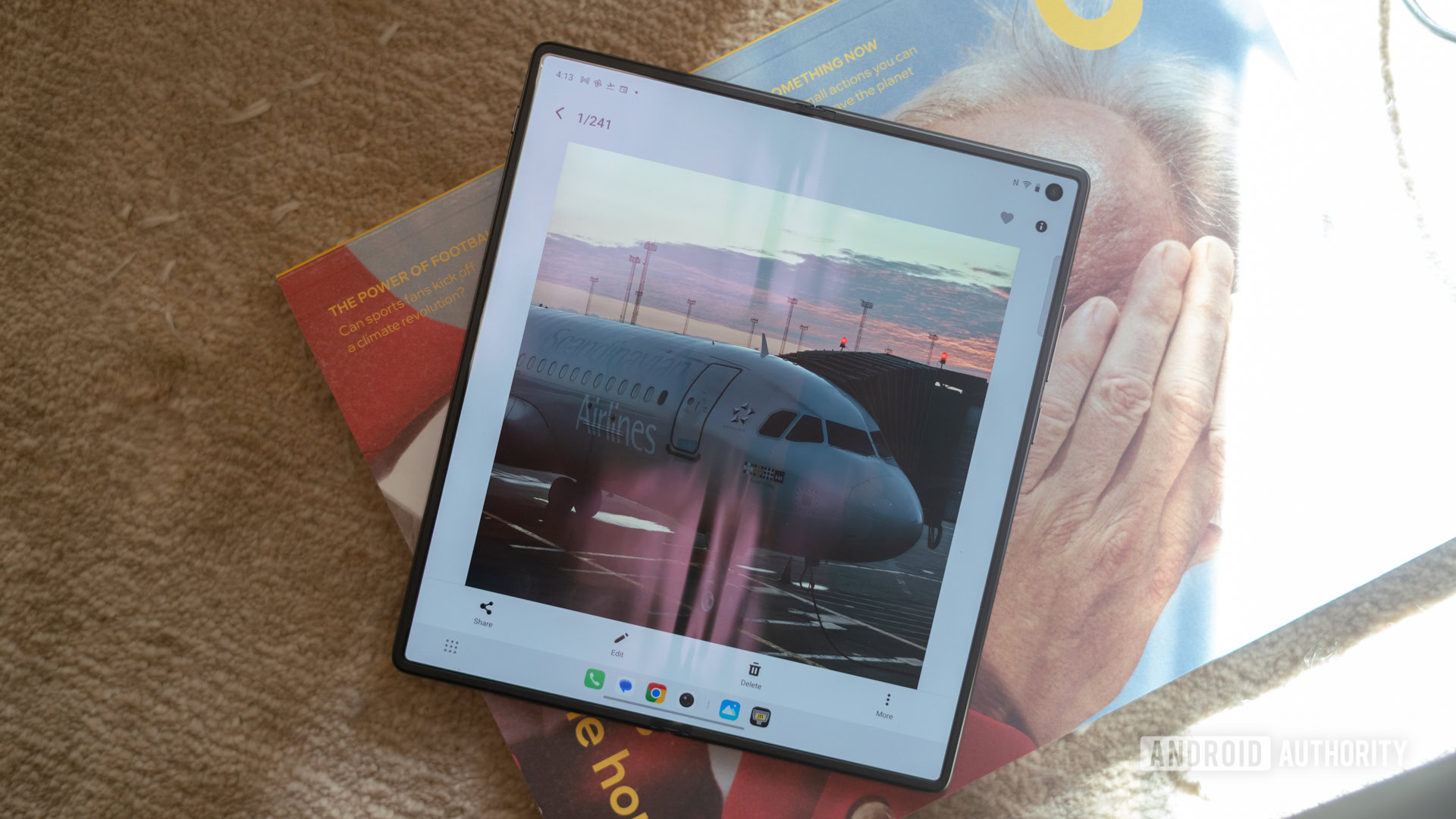
Dhruv Bhutani / Android Authority
On the OnePlus Open, the matte screen guard encouraged me to read more on the large screen, but a matte display isn’t ideal for watching media or reviewing photos. The vivo X Fold 3 Pro takes a different approach. Instead of a matte screen guard, its large, vibrant display boasts a claimed 4500 nits of brightness to combat sunlight glare. It’s bright and vivid enough to make you want to unfold the screen and pop open Netflix or YouTube. The stunning display also makes the best attempt I’ve come across yet to hide the telltale foldable crease, doing so well enough to be almost invisible. I’ve flown several flights to Europe over the last few weeks, and the X Fold 3 Pro has consistently replaced my iPad as my multimedia source.
On that note, a large part of why I carry the X Fold 3 Pro everywhere with me is its lightweight design and dimensions. Weighing in at 236g, the foldable doesn’t feel all that different from your standard candy bar flagships, and that makes all the difference.
The ultra-slim design, light 236g weight makes the X Fold 3 Pro feel like any other mainstream flagship.
vivo claims that the thickness has also been reduced to about 11.2mm, which does not account for the camera module. While the phone still leaves a bulge in my pocket, it’s less prominent than before — a step in the right direction. vivo achieved this weight reduction with a new carbon fiber hinge mechanism rated to survive 500,000 fold and unfold cycles for twelve years. Realistically, there’s no way to test that claim, but the hinge feels much more robust than the already excellent one on the OnePlus Open. If you like the idea of turning your smartphone into a mini laptop, the vivo X Fold 3 Pro’s hinge assembly is well-suited to holding various angles instead of just unfolding flat. Moreover, vivo has thought of that use case with specific software optimizations that I’ll discuss later.
Back to the design — most of the time, my foldable phone stays, well, folded, and I suspect this is true for the vast majority of foldable phone owners. As such, usability, when folded, is a very important criterion. vivo’s efforts toward making a foldable phone that feels like a regular smartphone are commendable. Like the previous generation X Fold 2, the X Fold 3 has under-display fingerprint readers both on the front and inner display, making accessing the phone a breeze.
Flagship internals
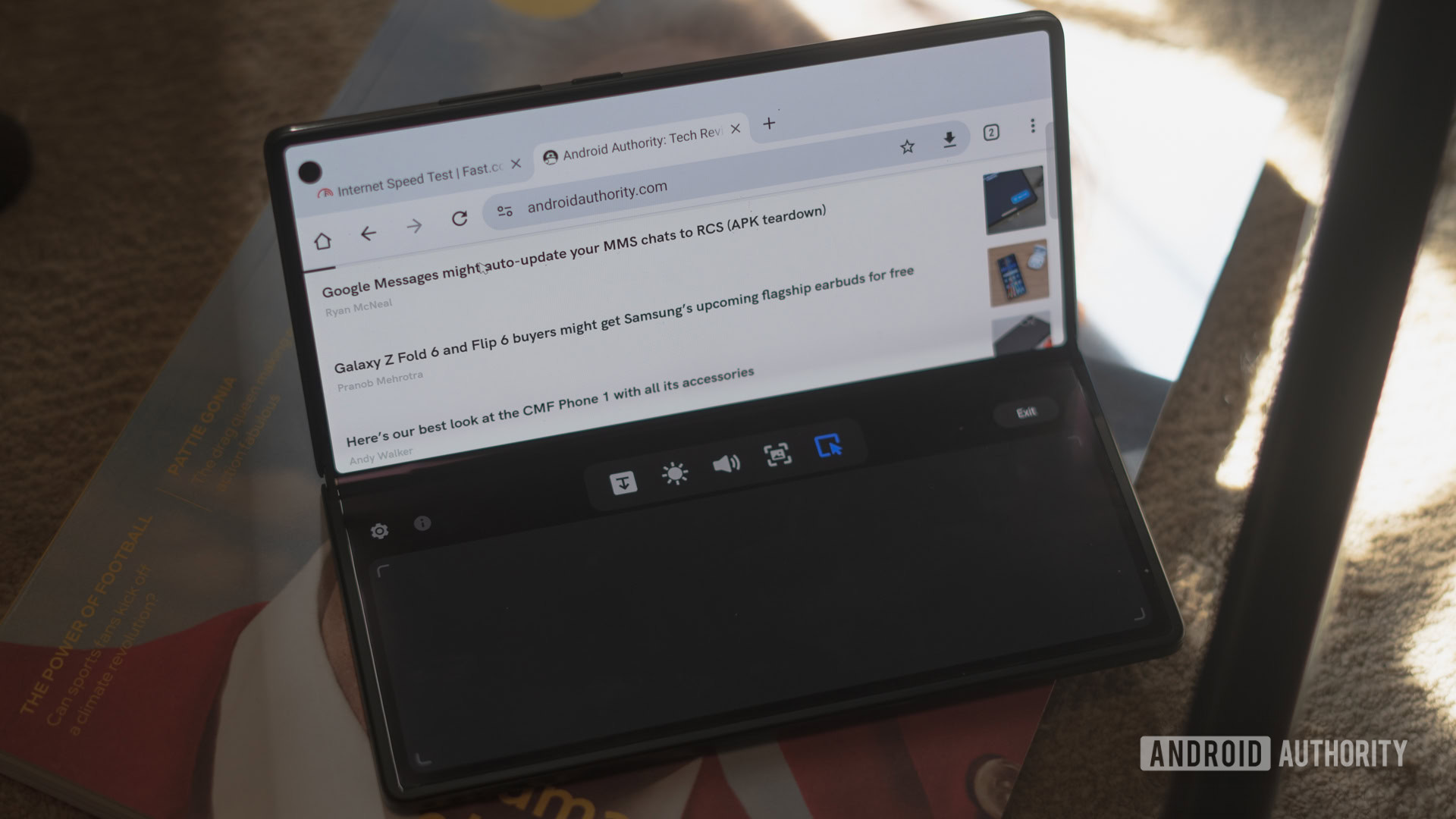
Dhruv Bhutani / Android Authority
Powered by a Snapdragon 8 Gen 3 chipset and 16GB of RAM, I had no major concerns about performance, nor was I expecting any. Heck, even the Snapdragon 8 Gen 2-powered OnePlus Open is more than enough for my use cases. What matters more, especially on a foldable, is the software—both in terms of polish and large-screen optimizations.
It’s not as feature-packed as Samsung’s flagships, but the X Fold 3 Pro brings several foldable-focussed enhancements.
Running Funtouch OS 14, based on Android 14, the vivo X Fold 3 Pro offers a polished experience — for the most part. It’s hard to overlook the abundance of pre-installed apps. While several can be removed, not all can. There’s ample customization on offer, just like any other vivo phone, but I was more interested in foldable-specific optimizations, and there are a few interesting choices here.
The one that stood out to me was a built-in split-screen mode that turns the phone into a laptop-like experience. Flex Mode, activated when the phone is folded somewhere between 75 and 115 degrees, is particularly impressive. It splits the active display in half and adds a touchpad along the bottom edge. Additionally, you’ll find shortcuts for basics like taking screenshots or adjusting screen brightness and volume. I would have brushed it aside as a gimmick, but I found it quite convenient on occasion to prop up the phone and use Flex Mode to watch YouTube.
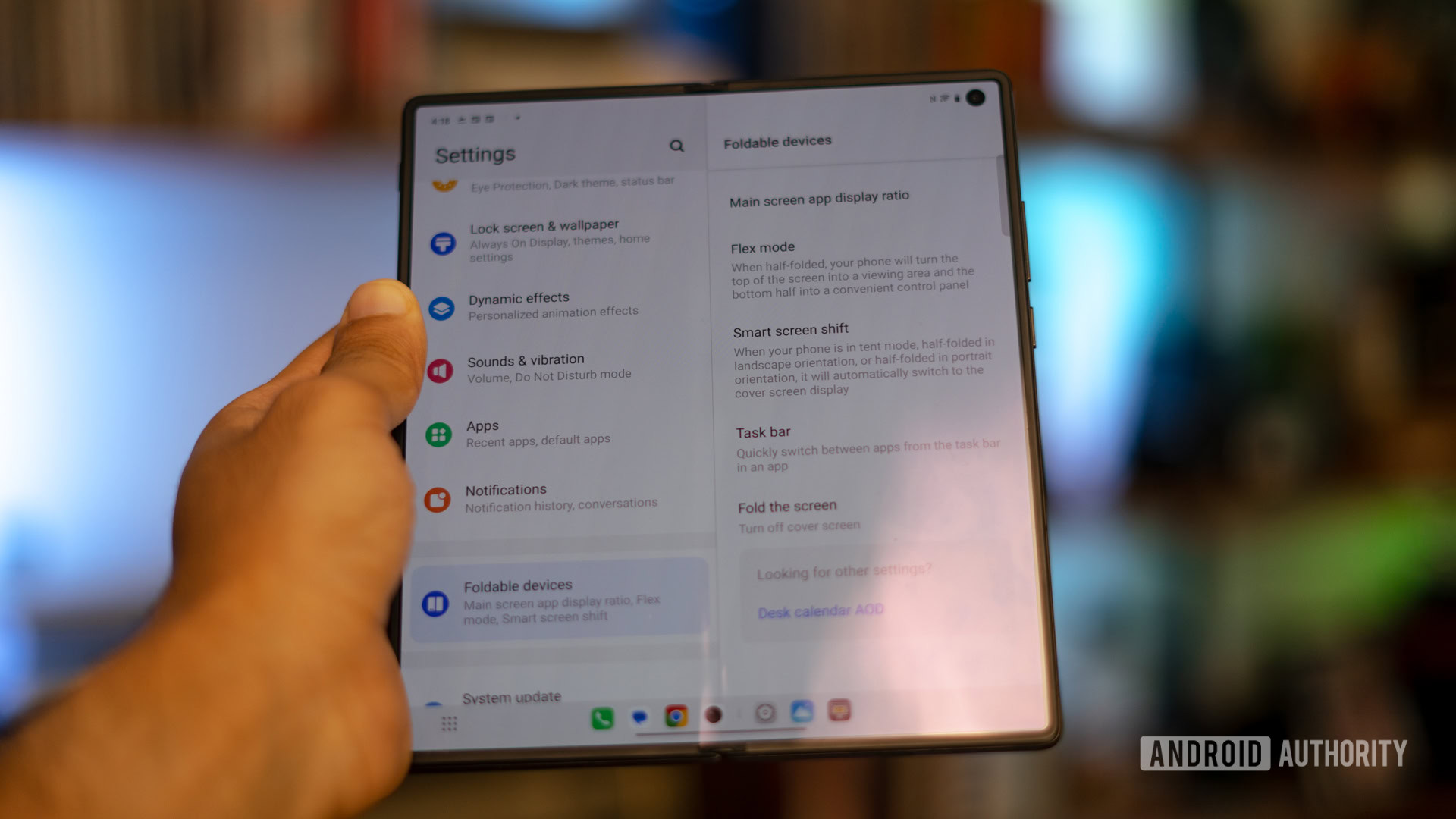
Dhruv Bhutani / Android Authority
Elsewhere, the fold-to-split functionality is absolutely a gimmick. The gesture relies on a snap of the phone to split active apps in half. Think of it like a shortcut for the built-in split-screen gesture. Great in theory but finicky in execution; I just can’t see anyone consistently snapping their pricey phone in half for ever-so-slightly faster multitasking. It doesn’t help that the feature isn’t consistent enough in execution.
Finally, if you’ve ever wanted an extremely expensive flip clock, the X Fold 3 has you covered. Placing the phone in tent mode can activate a large wide-screen always-on display. It’s curiously similar to Apple’s Standby Mode on the iPhone. However, it does not require your phone to be placed on charge to activate. Small wins. I ended up using the feature fairly regularly, though I’d be wary of accidentally knocking the phone to the floor while brushing your hand across the table.
Beyond that, vivo claims the usual Google Gemini-powered suspects, such as translation tools, transcription, and better note-taking. The overall package isn’t quite as comprehensive as Samsung’s, nor does it bring an equivalent of the excellent Canvas multitasking system on OnePlus phones, but it has enough to satisfy most users.
Best camera on a foldable so far?
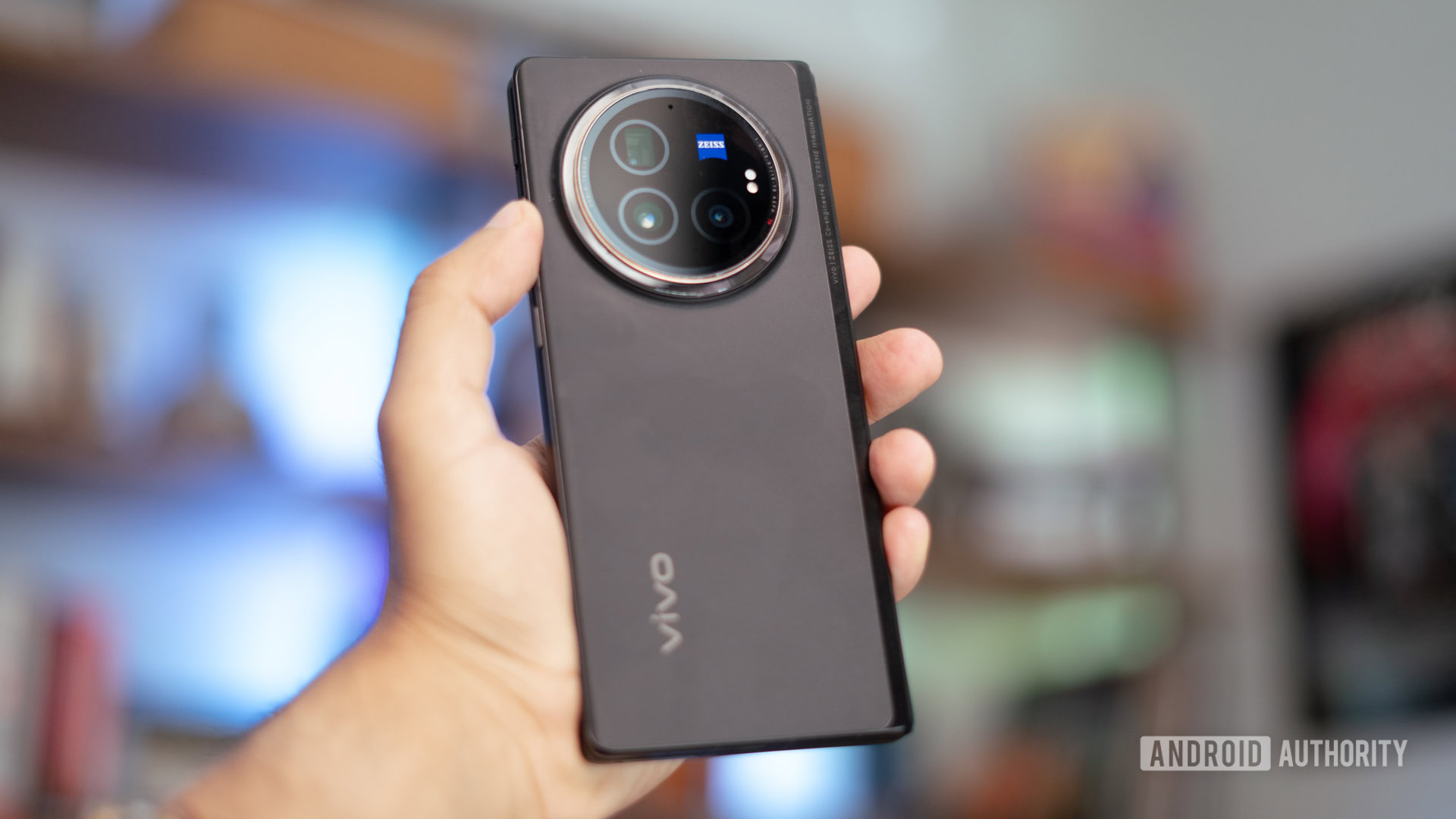
Dhruv Bhutani / Android Authority
While camera systems on foldable phones have been improving, they still lag behind traditional candy bar phones due to basics like size constraints. The vivo X Fold 3 Pro is the first foldable I’ve used that comes close to belaying that. The sensor configuration consisting of a 50MP primary camera, a 64MP telephoto lens with 3x zoom, and a 50MP ultrawide sensor is just one part of the equation. Much of the X Fold 3 Pro’s imaging prowess comes from software. I’ve waxed poetic about how much I like the vivo X100 Pro’s camera system. The X Fold 3 Pro doesn’t quite match that, but it comes close. Not just that, it’s a significant differentiator over the upcoming Samsung Galaxy Z Fold 6, which is expected to carry forward a very familiar set of sensors. As for the X Fold 3 Pro, I’ll let the camera samples do the talking.
Across its lenses, the vivo X Fold 3 Pro captures stunning shots. On a recent trip to Copenhagen, I decided not to carry along my camera, and the results didn’t disappoint. While I’m used to slinging my SLR or a more camera-focused smartphone along with my OnePlus Open, I didn’t miss those at all. Sure, the results aren’t quite as spectacular as those from the vivo X100 Pro, but even in low light, X Fold 3 Pro shows a lot of restraint over noise. Some detail is lost to noise reduction when pixel peeping, but I’ve been reviewing the images on a large 4K monitor, and the photos look pretty darn good. More so when you consider that these are from a foldable phone. The phone also carries forward the full suite of lens simulations and filters I’ve come to enjoy on the X 100 Pro.
Tremendous longevity
I don’t know how vivo managed it, but the X Fold 3 Pro ships with an enormous 5,700mAh battery. That would be impressive on any phone, but is doubly so on a phone as slim and light as this. Of course, it lends itself to incredible longevity, and a day and a half of use on a single charge is easily doable — even with extended use of the inner display. It boggles my mind that Samsung continues to ship the Z Fold-series with a measly 4,400mAh battery, but here we are.
The massive 5,700mAh battery keeps the X Fold 3 Pro going all day long, and more.
Elsewhere, the vivo continues to upstage Samsung and OnePlus with its charging specs. With support for 100W charging, faster than the 67W supported by OnePlus and four times as fast as Samsung’s 25W charging, the X Fold 3 Pro takes just a little over thirty minutes for a full charge. Should you, like me, prefer wireless charging, there’s support for that, too — all the way up to 50W.
vivo X Fold 3 Pro: My new favorite foldable, hamstrung by lacking availability
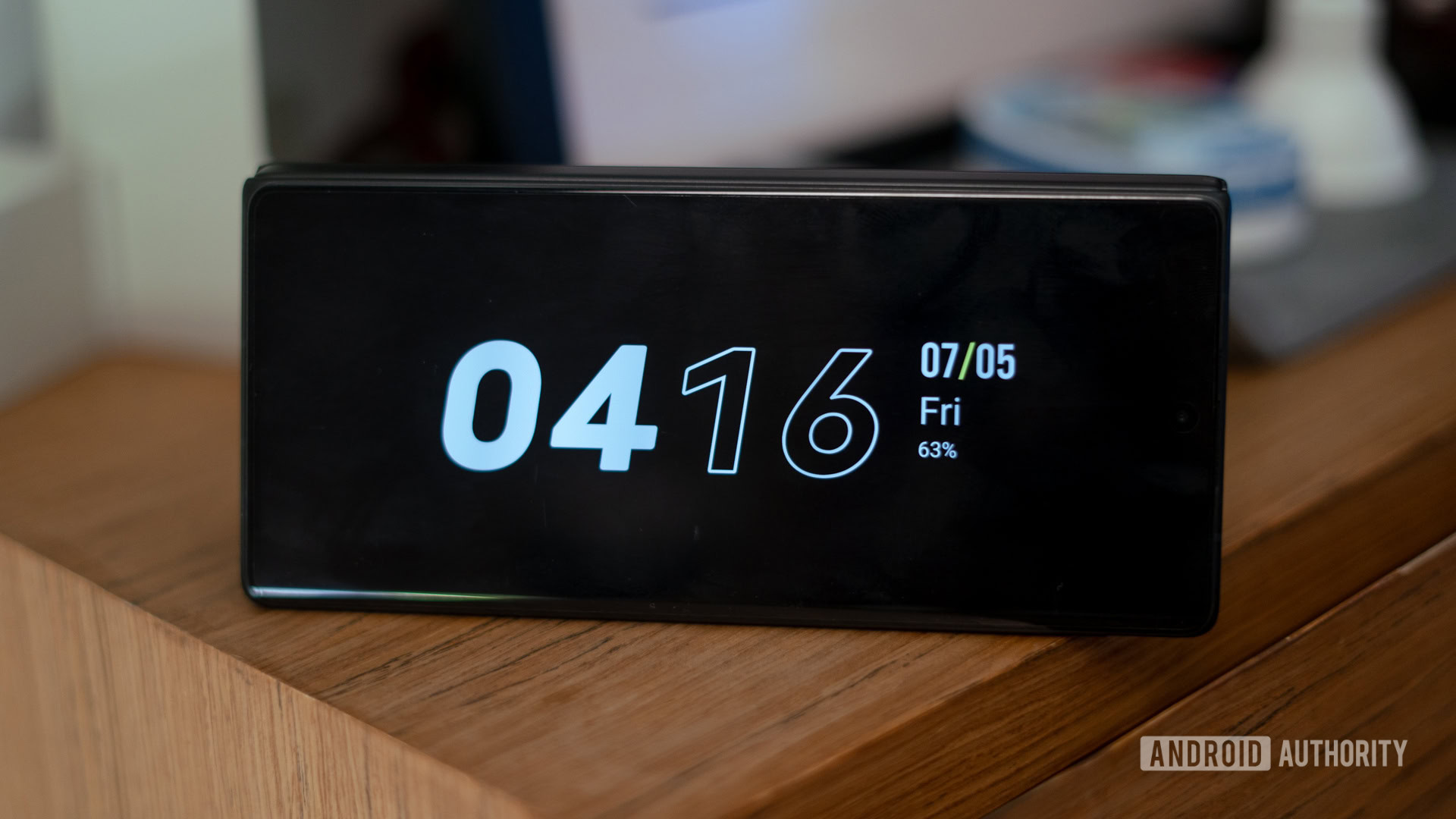
Dhruv Bhutani / Android Authority
vivo took the kitchen sink approach to the X Fold 3 Pro, and it shows. I could argue about the lack of bigger sensors from the vivo X100 Pro, but that phone is almost as thick as the X Fold 3 Pro without having an entire hinge and folding screen assembly. It makes sense that vivo had to cut back. Despite that, the image quality here is excellent, and so is the performance. While not as comprehensive as Samsung’s, the software package still has enough to please all but the most serious productivity enthusiasts. It’s no joke: the vivo X Fold 3 Pro is the most complete foldable I’ve used so far, and I’ve used many. Nor does it make me feel that I’m missing out on cameras, charging tech, or other features compared to the best mainstream flagships. Despite that, there are two areas where the phone falters — software updates and availability.
Limited availability and lacking software updates hold back the vivo X Fold 3 pro.
With just three promised updates and four years of security patches, the X Fold 3 Pro just can’t match up with the five years and beyond of support offered by Samsung. Elsewhere, availability is another concern. The vivo X Fold 3 Pro is only available in India and Indonesia. That alone makes it a non-starter as a viable alternative to the most popular foldables on the market for most. vivo isn’t trying to be aggressive with pricing either. In India, the phone is priced at Rs. 1,60,000 (~$1,900), which is par for the course for high-end foldables but bound to make you think twice before splurging.
Despite that, it is safe to say that vivo’s phone sets expectations sky-high for what a 2024 foldable should pack at a minimum and fires warning shots at Samsung’s glacial pace of innovation.

/static.texastribune.org/media/files/f5fdb1dff4d6fd788cba66ebaefe08d0/Paxton_GOP_Convention_2018_BD_TT.jpg)






